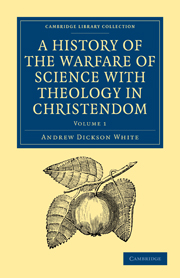Book contents
- Frontmatter
- INTRODUCTION
- Contents
- CHAPTER I FROM CREATION TO EVOLUTION
- CHAPTER II GEOGRAPHY
- CHAPTER III ASTRONOMY
- CHAPTER IV FROM “SIGNS AND WONDERS” TO LAW IN THE HEAVENS
- CHAPTER V FROM GENESIS TO GEOLOGY
- CHAPTER VI THE ANTIQUITY OF MAN, EGYPTOLOGY, AND ASSYRIOLOGY
- CHAPTER VII THE ANTIQUITY OF MAN AND PREHISTORIC ARCHÆOLOGY
- CHAPTER VIII THE “FALL OF MAN” AND ANTHROPOLOGY
- CHAPTER IX THE “FALL OF MAN” AND ETHNOLOGY
- CHAPTER X THE “FALL OF MAN” AND HISTORY
- CHAPTER XI FROM “THE PRINCE OF THE POWER OF THE AIR” TO METEOROLOGY
- CHAPTER XII FROM MAGIC TO CHEMISTRY AND PHYSICS
CHAPTER VI - THE ANTIQUITY OF MAN, EGYPTOLOGY, AND ASSYRIOLOGY
Published online by Cambridge University Press: 29 August 2010
- Frontmatter
- INTRODUCTION
- Contents
- CHAPTER I FROM CREATION TO EVOLUTION
- CHAPTER II GEOGRAPHY
- CHAPTER III ASTRONOMY
- CHAPTER IV FROM “SIGNS AND WONDERS” TO LAW IN THE HEAVENS
- CHAPTER V FROM GENESIS TO GEOLOGY
- CHAPTER VI THE ANTIQUITY OF MAN, EGYPTOLOGY, AND ASSYRIOLOGY
- CHAPTER VII THE ANTIQUITY OF MAN AND PREHISTORIC ARCHÆOLOGY
- CHAPTER VIII THE “FALL OF MAN” AND ANTHROPOLOGY
- CHAPTER IX THE “FALL OF MAN” AND ETHNOLOGY
- CHAPTER X THE “FALL OF MAN” AND HISTORY
- CHAPTER XI FROM “THE PRINCE OF THE POWER OF THE AIR” TO METEOROLOGY
- CHAPTER XII FROM MAGIC TO CHEMISTRY AND PHYSICS
Summary
THE SACRED CHRONOLOGY
In the great ranges of investigation which bear most directly upon the origin of man, there are two in which Science within the last few years has gained final victories. The significance of these in changing, and ultimately in reversing, one of the greatest currents of theological thought, can hardly be overestimated; not even the tide set in motion by Cusa, Copernicus, and Galileo was more powerful to bring in a new epoch of belief.
The first of these conquests relates to the antiquity of man on the earth.
The fathers of the early Christian Church, receiving all parts of our sacred books as equally inspired, laid little, if any, less stress on the myths, legends, genealogies, and tribal, family, and personal traditions contained in the Old and the New Testaments, than upon the most powerful appeals, the most instructive apologues, and the most lofty poems of prophets, psalmists, and apostles. As to the age of our planet and the life of man upon it, they found in the Bible a carefully recorded series of periods, extending from Adam to the building of the Temple at Jerusalem, the length of each period being explicitly given.
Thus they had a biblical chronology—full, consecutive, and definite—extending from the first man created to an event of known date well within ascertained profane history; as a result, the early Christian commentators arrived at conclusions varying somewhat, but in the main agreeing.
- Type
- Chapter
- Information
- A History of the Warfare of Science with Theology in Christendom , pp. 249 - 265Publisher: Cambridge University PressPrint publication year: 2009First published in: 1896



